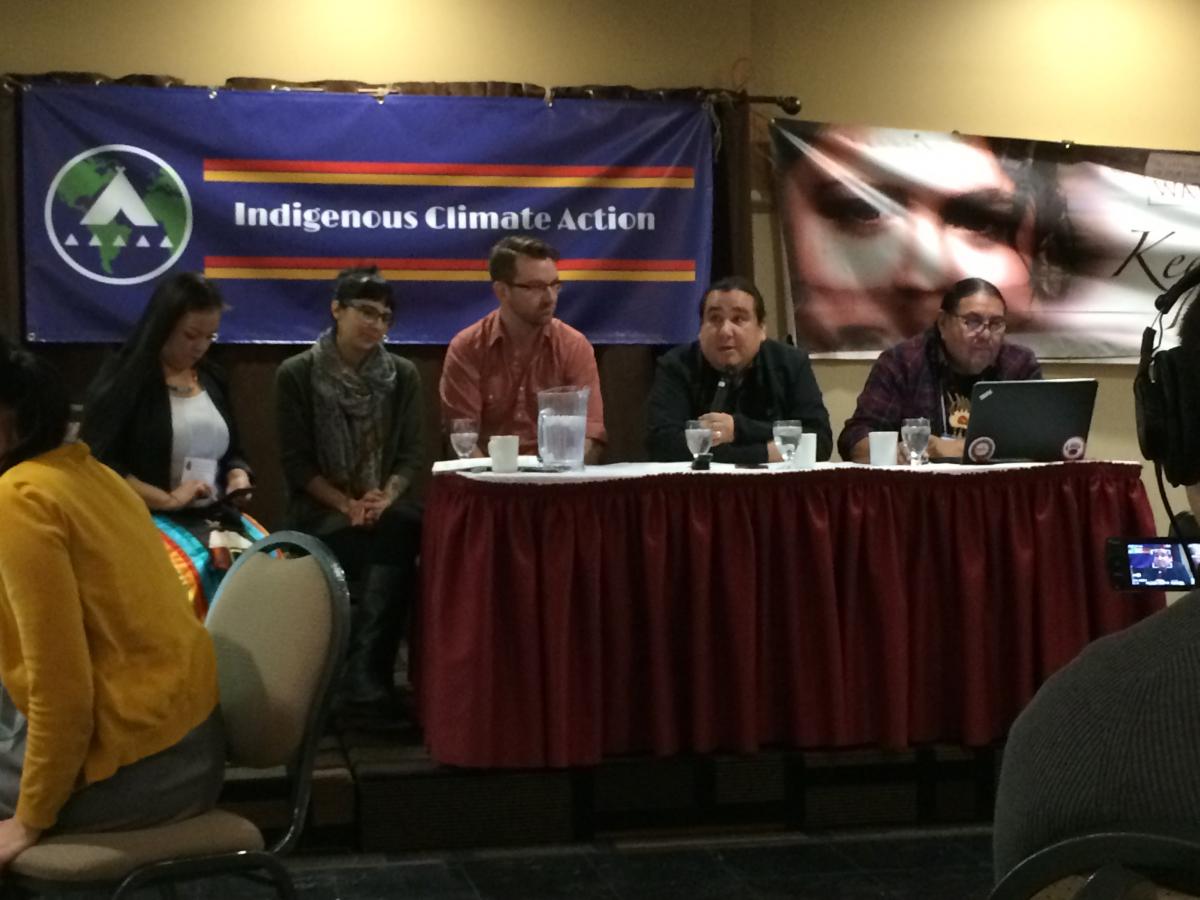Like this column? rabble is reader-supported journalism. Chip in to keep stories like these coming.
The Council of Canadians was proud to help support a groundbreaking Indigenous Peoples Meeting on Climate Change on January 24-26 on Treaty 6 Territory in Edmonton, Alberta.
Members and leaders of nations from around the country were brought together, and filled a hotel conference room to share and hear stories, to learn from each other about climate change impacts and ways forward, and to contribute to the development of an Indigenous peoples climate change position paper and action plan. Topics of the conference included climate change policy, community successes, the United Nations Declaration on the Rights of Indigenous Peoples (UNDRIP), Indigenous food and energy security/sovereignty, and many other interrelated topics brought up through stories and presentations.
When speaking on pipelines and Canada’s commitments at COP21, Tom Goldtooth, Executive Director of the Indigenous Environmental Network, quoted Council of Canadians’ Maude Barlow saying “goals without actions to back them are more hot air” — referencing how the Energy East pipeline goes against any intention to honour the agreement made in Paris.
On the topic of the Alberta Climate Change Strategy, Eriel Deranger, grassroots Indigenous climate leader and member of the conference’s Steering Committee, spoke about the lack of consultation with Indigenous Peoples and how to hold the government accountable to that obligation. She connected her international experience in Paris to her experience as a member of Athabasca Chipewyan First Nation, saying “the struggle for Indigenous rights is happening at every level of government” and how, worldwide, Indigenous peoples “contribute the least to climate change, but are the first to feel climate change.”
Clayton Thomas-Muller of 350.org encouraged the gathering to stand by their Indigenous rights, which are “constitutionally and legally protected by over 200 legal precedents and many international treaties.” He talked about the challenges of interacting with the provincial and federal governments — especially since their jurisdictions are divided, and it can be unclear whose responsibility it is to consult with Indigenous peoples (natural resources are jurisdiction of the provinces, but agreements and treaties are generally with the Crown or Government of Canada).
During a panel on Indigenous rights, Ellen Gabriel, Mohawk activist and leader, spoke about the importance of knowing Indigenous rights to develop a framework for peace and justice that is meaningful to Indigenous Peoples. She acknowledged that the current system of rights is imposed by a colonial system of governance, and if Indigenous peoples “don’t know what our rights are then the colonizer determines this for us.” During this panel, Arthur Manuel also spoke of the three components of colonization: dispossession of land and culture, dependency on the colonizer, and oppression to keep people from fighting back. He mused about how colonization was done “legally” through British law, and reinforced the fact that only 0.2 per cent of land in Canada is in reserves for Indigenous Peoples. Danika Littlechild finished off the panel with stories of her experiences in the United Nations system. She told positive stories of her successes in using UN tools to fight for Indigenous rights, but also the challenges of using this system that does not recognize Indigenous nations as sovereign “states” in international negotiations. She concluded by encouraging the gathering to think about how Indigenous peoples are represented in international forums, and how they would like to be represented.
The meeting was thrilled to have Winona LaDuke, well known Native American activist, present on renewable energy as well as food security and sovereignty. She spoke about her fight against pipelines in her community, using relentless tactics of going to “every damn hearing” and organizing separate hearings within the jurisdiction of her nation. She gave examples of renewable energy and food projects in Indigenous communities across the continent and told the crowd to have the courage to try starting projects in their own communities, saying “[she] has worked on projects that have failed miserably” but she doesn’t see waiting for someone else to fix things as an option.
Using each other’s knowledge and experiences to envision a way forward for communities was a major theme of the meeting. A “Solutions Panel” explored successful community energy projects for T’Sou-Ke Nation, the Lubicon Cree, and on Haida Gwaii. Solar project tours were also on offer for communities interested in seeing these examples first-hand. Breakout group sessions focussed on gathering suggestions from participants to help outline actions to advance a strategy for an Indigenous climate action plan. The need for education and technical skills, renewed relationships within and between communities, and ensuring youth learn Indigenous ways of being arose as major themes in these conversations.
This first Indigenous peoples meeting on climate change was filled with good information and good energy, and will hopefully be the first of many. To learn more please visit http://www.indigenousclimateaction.com/.
The conference was hosted by The Keepers of the Athabasca, the Beaver Lake Cree Nation, the Athabasca Chipewyan First Nation, and 350.org. Indigenous Climate Action Steering Committee members: Crystal Lameman, Jessica Cardinal,ErielTchekwie Deranger, Melina Laboucan-Massimo, Clayton Thomas-Muller, and Sheila Muxlow.
Speakers at the conference included: Grand Chief Stewart Phillip (Union of BC Indian Chiefs), Winona LaDuke (Honor the Earth), Tom Goldtooth (Indigenous Environmental Network), Mike Hudema (Greenpeace Canada), Chief Gordon Planes (T’Sou-Ke Nation — renewable energy projects), Barbara Wilson (Haida Elder), Danika Billie Littlechild (Canadian Commission for UNESCO), Arthur Manuel (former chair and elected Chief of Shuswap Nation Tribal Council), Ellen Gabriel (spokesperson to protect the Pines during the “Oka” crisis), Ron Lameman (Confederacy of Treaty No. 6 Bilateral Treaty Coordinator, and member of the Beaver Lake Cree Nation), Chief Germaine Anderson (Beaver Lake Cree Nation), Grand Chief Tony Alexis (Grand Chief of the Confederacy of Treaty No. 6, and Chief of Alexis First Nation).
Like this column? rabble is reader-supported journalism. Chip in to keep stories like these coming.



